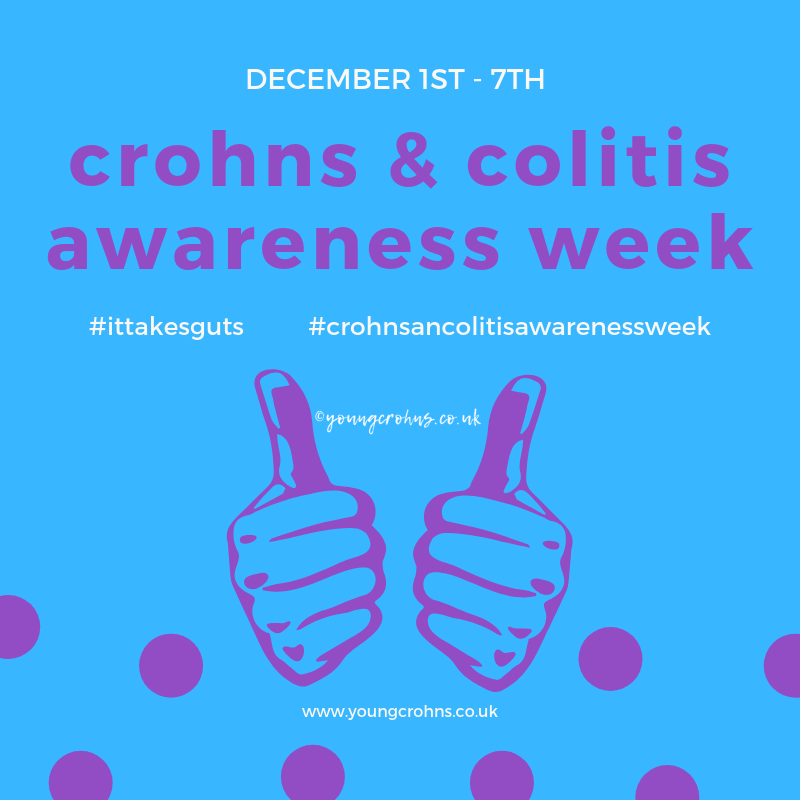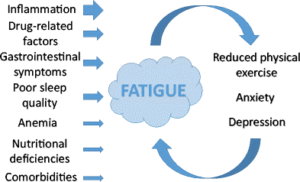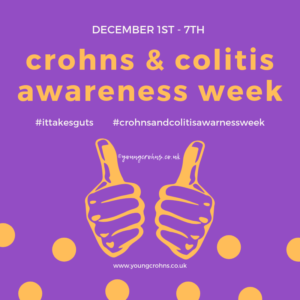
Crohns & Colitis Awareness Week – December 4th: Fatigue
Part of the week of daily blogs for #crohnsandcolitisawarenessweek Read the entire week here.
For most, tiredness comes when you’re overdoing it – working too many hours, being social, finding things to do instead of sleep. But when you have a chronic illness, the fatigue is a next level of tiredness.
I find myself stopping from saying ‘I’m tired’ because this invites so many people to say the same back to me, when really they aren’t feeling the same tiredness as me.
My fatigue hits like a brick.
My fatigue knocks me sideward and is not solved by a nap or a long lie in.
Whilst they help, they can also hinder.
Fatigue comes from a lack of physical and mental energy. These two things can happen independently or as a combination. They can vary from day-to-day, even hour to hour.
It is not same as being lazy, I find it very hard to even find motivation to move when I am fatigued. I can be like a zombie; just going through the motions of my daily life, waiting for sleep but knowing it won’t ‘cure’ this dirt tired feeling I have.
I’ve found that my medication – Vedolizumab – can help boost my energy, as well as my regular injections of B12. But, outside of that, it is hard to combat. There is no treatment for it because there is not a definite cause. We know that 3/4 of those IBD patients in a flare up experience fatigue. But what about when your disease is not flaring or it’s inactive / stable? I bet for the majority of IBD patients, they find fatigue comes and goes with their disease; it is just part of it.
And whilst we don’t know one cause of why fatigue affects some and not others, there is research in to possible causes:

And as you can see, fatigue doesn’t just end with feeling tired. It also can trigger flare ups of anxiety and depression within patients. So whilst it’s still not understood, there is research happening to look into this.
Talk about Fatigue
It’s well established that fatigue can be hard to describe, thus making it hard to talk about. This might make it difficult to talk to your doctor about your fatigue, and therefore miss out on receiving help.
From the Crohn’s and Colitis UK Fatigue in IBD study, fatigue was described by IBD patients as:
- Brain fog
- A big black hole
- Being woozy or fuzzy
- Zombie mode
- Overwhelming heaviness
- Just shattered
- Completely wiped out
Some doctors and nurses are not aware how much fatigue can affect people with IBD, so they may not actively ask about it during an appointment. Fatigue is not a personal failing, and is nothing to be embarrassed about. It’s always important to discuss all of your symptoms and concerns with your doctor or IBD team. And of course, by just telling doctors and nurses you are tired doesn’t ring the same alarm bells as other symptoms might. But, living with persistent fatigue is unacceptable, so you may have to push more than usual to get the care you need.
How can you manage fatigue?
There are a range of actions you can take to reduce or manage your fatigue:
- Get checked to make sure you do not have active IBD. This might be done with a blood test or stool test. From here they can determined if your IBD is active; and then you will need treatment to see whether your fatigue improves alongside your IBD improving. This could mean changing the dose or type of medicine that you are taking. Speak to your doctor if you think your medication may be causing your fatigue, as they might be able to adjust the dose or find an alternative medicine.
- If your IBD is in remission, you could ask for a blood test to check for anaemia, iron stores, vitamin B12, and other chemical or nutrient deficiencies.
- There is some evidence that low to moderate intensity physical activity may reduce IBD fatigue. You could try gradually to increase the amount of physical exercise you do. It is important to achieve the right balance between doing too much and exhausting yourself, and not doing enough to make a difference. This could take time to build up, doing so slowly over several weeks.
- If you smoke, stopping smoking can also help to reduce IBD fatigue.
- If pain is contributing to your fatigue, you may wish to discuss pain management strategies with your IBD care team.
I’ve written more about fatigue on my own site here.
Do you have any questions or queries? Or just want to share your own experiences? You can leave me a reply here or leave comments via my social media accounts – on Twitter, find my blog page on Facebook and over on Instagram

Further Reading:
Crohn’s and Colitis UK – What Causes Fatigue in IBD? – Fatigue and IBD – Fatigue in IBD Study





1 Comments
"How does sleep affect IBD?" •
28/04/2021 at 09:33
[…] enjoyed this post check out Crohns and Colitis Awareness Week – December 4th: Fatigue and Crohns and Colitis Awareness Week – December 5th: […]